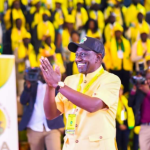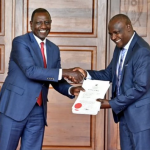Austria’s far-right Freedom Party (FPÖ) is heralding a new era following an unprecedented election victory, according to its leader, Herbert Kickl. His party secured 29.2% of the vote, based on official provisional results, surpassing the conservative People’s Party (ÖVP), which garnered 26.5%. However, this result falls short of an outright majority.
Kickl celebrated the victory as part of a larger trend of far-right successes across Europe, commending voters for their “optimism, courage, and trust,” which he believes have delivered a “piece of history.” While the FPÖ has previously entered coalitions, the ÖVP, now in second place, has stated it will not participate in a government led by Kickl. Incumbent Chancellor Karl Nehammer of the ÖVP remarked, “It’s impossible to form a government with someone who adores conspiracy theories.”
The election saw a high turnout of 74.9%, with issues of migration, asylum, a struggling economy, and the war in Ukraine dominating the campaign. As half of Austria’s electoral map turned dark blue, FPÖ General Secretary Michael Schnedlitz proclaimed, “The men and women of Austria have made history today,” though he refrained from outlining the type of coalition the party would pursue.
Voter analysis indicated that those aged 35-59 were the most likely to support the far-right party, with slightly more women voting for it than men. The FPÖ now holds 58 seats in the 183-seat parliament, while the conservatives have 52 and the Social Democrats 41.
Kickl has pledged to construct a “Fortress Austria,” vowing to restore security, prosperity, and peace. He has also drawn parallels with Viktor Orban in Hungary. In contrast, Social Democrat leader Andreas Babler cautioned against Austria following in Hungary’s footsteps. Additionally, Kickl has expressed ambitions of becoming Volkskanzler (people’s chancellor), a term that some Austrians associate with Adolf Hitler in Nazi Germany.
The Freedom Party (FPÖ), founded by former Nazis in the 1950s, faces challenges in coalition-building after a controversial election victory. Just two days before the vote, some FPÖ candidates were filmed singing an SS song at a funeral, prompting a small group of protesters to gather outside parliament with anti-Nazi banners as the election results rolled in.
Kickl’s path to forming a coalition is likely to be complicated, given his divisive reputation. The Social Democrats, Greens, and Neos have all ruled out partnerships with the far right, leaving the FPÖ with limited options. The only feasible coalition could involve the conservatives (ÖVP), but that would require addressing the ÖVP’s refusal to support Kickl as chancellor.
In a similar situation in the Netherlands last November, Geert Wilders of the Freedom Party abandoned his bid for prime minister to facilitate coalition talks with three other parties. However, Kickl has expressed a strong desire to lead, promising to be the “servant and protector” of the Austrian people.
Political analyst Thomas Hofer noted that it remains uncertain whether Austrian President Alexander Van der Bellen would grant Kickl a “direct mandate to form a coalition.” The ÖVP could potentially cobble together a coalition with the Social Democrats, and might also include the liberal Neos party or the Greens, based on the latest projections. However, Karl Nehammer, the current chancellor, may face internal pressure within the ÖVP to reconsider his stance against Kickl.
President Van der Bellen has previously voiced concerns about the FPÖ due to its criticism of the EU and its failure to denounce Russia’s invasion of Ukraine. The FPÖ opposes EU sanctions on Moscow, citing Austria’s neutral stance, and several of its MPs walked out during a speech by Ukraine’s Volodymyr Zelensky in Vienna last year.
Kickl’s electoral success continues a trend of rising far-right parties in Europe, following recent victories by Italy’s Giorgia Meloni, who leads a right-wing coalition with the Brothers of Italy party, and Germany’s AfD, which topped the polls in Thuringia last month. France’s National Rally also emerged victorious in the European elections last June.
Unlike Herbert Kickl, Italy’s Prime Minister Giorgia Meloni has fully supported the EU’s defense of Ukraine amid Russia’s full-scale invasion. Following the election results, AfD co-leader Alice Weidel congratulated Kickl, sharing a photo of the two together, while Marine Le Pen of France’s National Rally celebrated the “groundswell carrying the defense of national interests,” emphasizing the “people’s triumphs everywhere.”
Geert Wilders remarked that “times are changing,” highlighting that “identity, sovereignty, freedom, and a halt to illegal immigration and asylum” are what millions of Europeans are yearning for.
Kickl has effectively tapped into concerns over immigration in Austria and leveraged widespread frustration over the government’s handling of the COVID-19 pandemic, aligning himself with conspiracy theories regarding unconventional treatments for the virus.
For Kickl and the FPÖ, the election victory on Sunday marks a significant resurgence from 2019, when they placed a distant third following a scandal involving a video sting that implicated their former leader.



